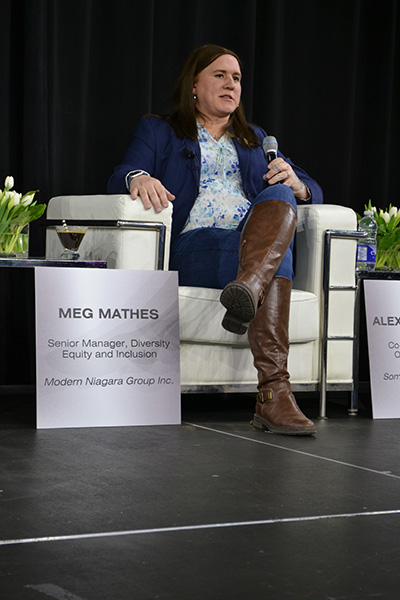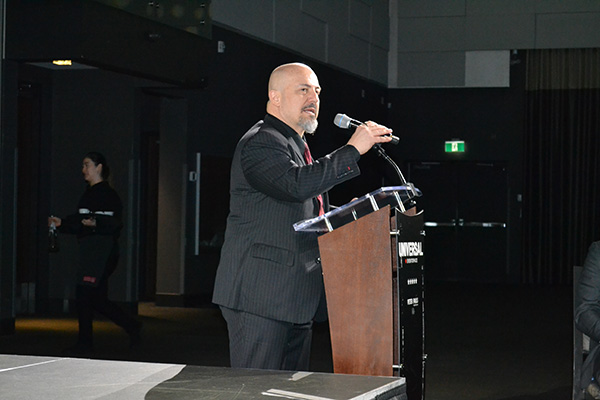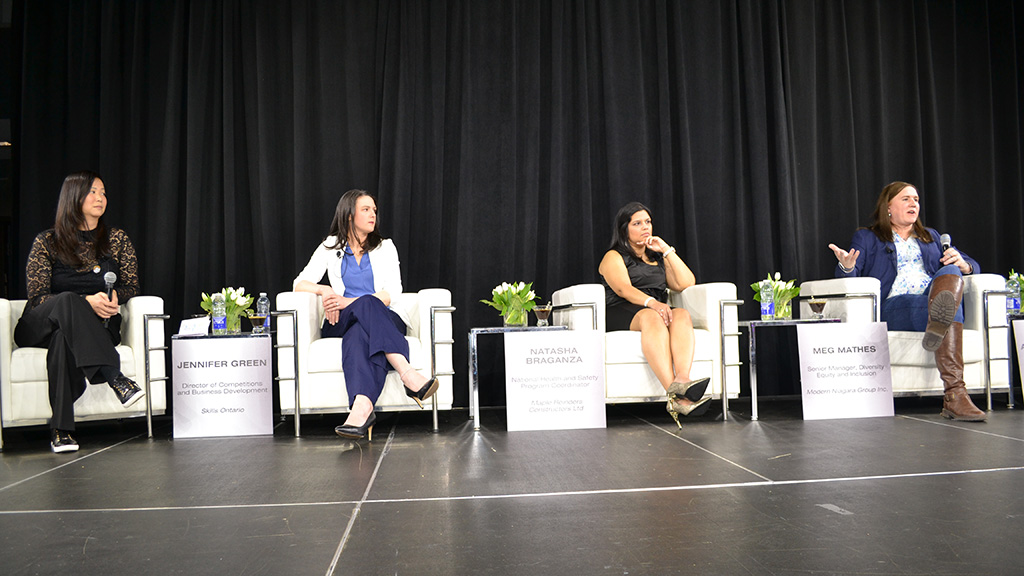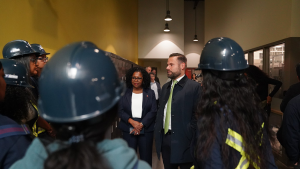As an openly transgender woman, Meg Mathes, senior manager of diversity, equity and inclusion at , said one of the most difficult things she’s ever done in her life is coming out as transgender.
“I kept hoping and wishing and praying that someone else would go before me, someone else in some kind of a senior position or someone else in the trades. It just never happened,” she said.
Mathes was part of a panel of women who spoke to over 500 delegates at the Women in Construction Gala, organized by the in partnership with the in Vaughan, Ont.

“I knew when I was about five years old that I was transgender,” she recalled. “I didn’t know that’s what it was called but I knew there was something different. At age seven when I wanted to talk to my parents about it, my older sister in high school had a transgender person in her class and they decided to make fun of that person at our dinner table, so I knew that it wasn’t really a safe space for me at home.”
She kept it bottled up until she was about 14. Then she tried to come out again.
“That time I was kicked out of the house. I lived in a psych ward for six months,” Mathes said. “They talked about conversion therapy, so I just lied to them and I said I was seeking attention and got out of there. I lived in foster care for a bit and then I lived on my own and started working at Burger King.”
She ended up getting into the trades because she was working the night shift and when the equipment would break, she kept trying to fix it instead of calling the repair company.
“They (the repair company) saw me as a threat and an opportunity and they offered me a job,” said Mathes. “I’ve had a very successful career in the trades. I worked in the field for about 12 years. I worked in leadership positions for about another 12 after that. But at the end of the day I was just never being true and authentic to myself. I was being the best version I could be because of the stereotypes, because of the bias, because of the systems that were put in place.”
Since coming out and being accepted by her family and children, she has dedicated much of her time to advocating for inclusive workplaces.
“I’m very thankful to the folks at Modern Niagara for supporting me, encouraging me and allowing me to take that space in your organization,” she added.
There is power in ‘yes’
In her experience, Natasha Braganza, national health and safety administrator at , said women, who tend to be people pleasers, are always told to learn to say no.
“I also want to tell you there is great power in yes,” she pointed out.
She remembered times when she was given menial tasks like taking meeting minutes.
“I could have very easily said, ‘No, I am above this,’” she said. “I had good reasons to say no, but I said yes. I learned things in those meetings. I learned things from senior managers that they were talking about things in the company that nobody else knew about, but I knew about. I learned how people do business. I learned how to address certain people and their problems. “Don’t get steamrolled…but learn that there is a power in yes. There is power in saying, ‘I can do this task and not only am I going to do it, I’m going to kill it.’”

Being a public company, showing support and having your employees’ backs is also important, said Jennifer Green, director of competitions and business development with .
“What is your program for women in the trades? What is your program for DEI? How are you there for your employees?” asked Green. “Tell them, be public. When they Google and look at your website they know that they’ve got my back. If anything ever happens to me I know that they’re going to help me.”
‘Stop making yourself small’
Jennifer Khan of said she has spent the last 20 years of her life “de-bitchifying.”
“My 18-year-old self was not a very nice person,” she said. “I was successful in my role. I knew what I needed to do. I thought that everyone should do it the way I wanted to because it was the right way. In the last 20 years I’ve learned ways to let go. I found ways to accept who I am and I found ways to thankfully … de-bitchify,” said Khan. “That process for me was important to find happiness and important for me to find self-care and important for me to find the energy, instead of being not so nice to do something that was actually meaningful.”
She had a piece of advice for women in the room.
“Stop making yourself small,” she said. “Why have I spent so many years making myself so small so somebody else can feel big …I think my biggest obstacle, to this day, is me.”
Women talk time of the month
The women also tackled a topic the most men onsite rarely want to address – menstrual health.
“I spent two years talking about menstruation to people who don’t menstruate,” Khan explained, adding EllisDon offers menstrual products on sites and in offices. It costs about $10 a month per site.
“Menstruation is no big deal. We’re really talking about providing products that half of the population uses at some point in their lives.”
Braganza said it’s also important to have open communication about these topics as it relates to fit for duty.
“Some people get terrible cramps and take very strong painkillers,” said Braganza.
“I don’t want a lady or a person that menstruates to have an accident on a site because they just couldn’t say to somebody, ‘Today, I can’t operate this machinery because I’m on some medication.’”
Follow the author on X/Twitter @DCN_Angela.






Recent Comments
comments for this post are closed